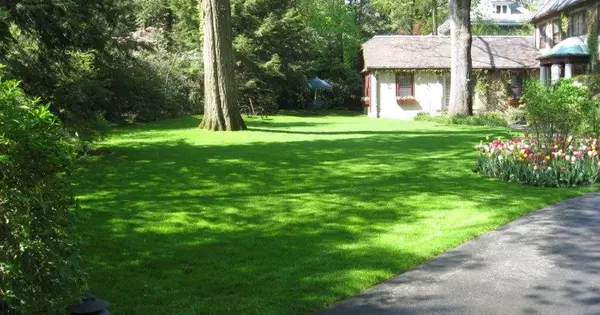The practice of establishing and caring for an athletic turf field or garden lawn and landscape using organic horticulture, without the use of manufactured inputs such as synthetic pesticides or artificial fertilizers, is known as organic lawn management, organic turf management, organic land care, or organic landscaping. It entails keeping a healthy and vibrant lawn without using synthetic chemicals or pesticides. It emphasizes working with nature rather than against it to create a sustainable and environmentally friendly lawn.
It is a component of organic land care and organic sustainable landscaping that applies the principles and practices of organic gardening and organic farming to lawn and garden care.
Here are some key principles and practices for organic lawn management:
- Soil Testing: Start by conducting a soil test to determine the pH level and nutrient content of your soil. This will help you understand what your lawn needs and allow you to make informed decisions about soil amendments.
- Soil Health: Build and maintain healthy soil by adding organic matter such as compost and well-rotted manure. Healthy soil supports strong grass growth and reduces the need for fertilizers.
- Grass Selection: Choose grass varieties that are well-suited to your region and climate. Native or drought-resistant grasses can reduce the need for water and maintenance.
- Mowing Practices: Maintain your grass at the appropriate height to encourage healthy growth. Avoid cutting more than one-third of the grass height at a time, as this can stress the lawn.
- Watering Wisely: Water deeply and infrequently rather than shallowly and often. Early morning is the best time to water to minimize evaporation. Use a rain gauge or moisture meter to gauge when your lawn needs water.
- Natural Fertilization: Use organic fertilizers, such as compost or organic-based products, to provide essential nutrients to your lawn. Avoid synthetic chemical fertilizers, which can harm the environment and promote excessive growth.
- Mulching Grass Clippings: Leave grass clippings on the lawn after mowing (grasscycling). This returns nutrients to the soil and reduces the need for additional fertilization.
- Pest Control: Encourage beneficial insects and natural predators to control pests like grubs and insects. Avoid using chemical pesticides, as they can harm beneficial organisms and disrupt the ecosystem.
Plant native flowers, shrubs, and trees to increase biodiversity on your lawn. This draws pollinators and helpful insects, making the ecology healthier. Reduce your environmental impact by using eco-friendly and energy-efficient lawn care equipment, such as electric mowers and battery-powered gadgets. Organic lawn care may take some time to establish, but in the long term, it often results in a more robust and sustainable grass.
















